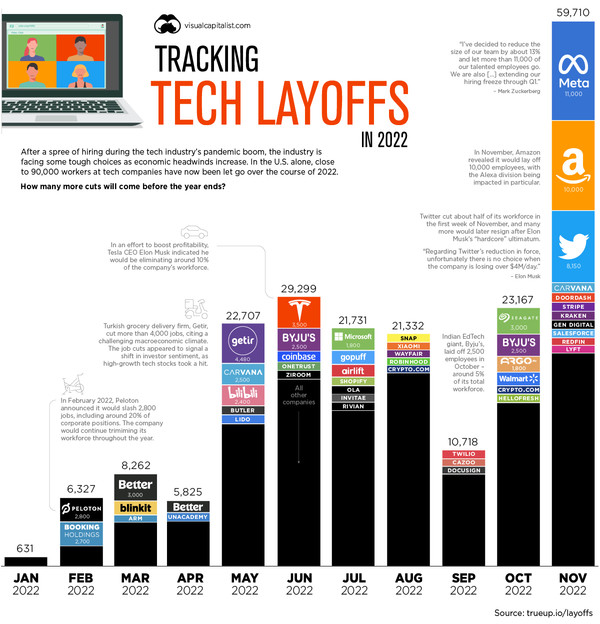Since the beginning of 2022, big tech companies have been laying off employees at a rapid pace, closing entire departments and discontinuing projects. Particularly, Google seems to be taking up most of the spotlight in media, with CEO Sundar Pichai explaining that the layoffs are a consequence of rapid hiring during the pandemic: “Over the past two years, we’ve seen periods of dramatic growth. To match and fuel that growth, we hired for a different economic reality than the one we face today.” The number of those affected by this change crosses well over 100,000 people, some of which shared their stories on social media. Although this "trend" can be viewed from multiple perspectives — the future focus of big tech toward AI, the shock of the affected, the legal repercussions and labor union strikes — what can also be inferred from it is the software industry's obsession with the vanity of being a FAANG employee (short for "Facebook Amazon Apple Netflix Google", now a popular term for all big tech companies).

Of course, the FAANG companies provide amazing opportunities and are widely considered to be "resume boosters" for new entrants to the industry. Companies like Google and Meta give multiple bonuses that dramatically increase one's quality of life, guaranteeing meals free of charge, reimbursing expenses on sports and healthy lifestyle purchases, allocating facilities and staff for stress-relieving activities, and so on. That, however, is only one side of the industry — these perks are only possible because of the companies' success and vast capital. The other — these numbers have to grow no matter what. The employees are trained on statistics; developers are tasked with building highly scalable features with no flaws and weaknesses; marketers and strategists are judged by their results. Much like working for the tech giants feels like being a small gear in a massive clock mechanism, the impact of one's job is pretty limited — decisions that tangibly affect the product are made by entire departments after multiple levels of management approve them. This is not about whether or not big companies are better than startups or smaller companies; this is about society's bloated perspective. Layoffs for these companies are natural — they cut costs, focus on raising profits, and prepare for losses.
Firms do not cut down corporate spendings just by firing employees starting from the bottom of the career ladder; every step is (at least was before the layoffs started) considered essential to the company and relatively well-compensated. Senior management, business people, developers, newcomers — everyone was affected. What is the metric then? Who was considered inefficient enough to fire? And how will a big fat "laid off" text look on the resumes of the now unemployed? The recent layoffs have shown that job security in big tech is far from guaranteed, hitting the affected like a train. Many ex-employees said they were suddenly unable to access their work files; their accounts were locked with one email notifying them of their fate. Employees who have dedicated years of their lives to these companies suddenly find themselves without a job, with no clear understanding of why they were let go or what their future holds. While experienced professionals may still be valued in the industry, fate can be a bit different for those not experienced enough to transition easily. Big companies teach big moves; they teach strategic trajectories over risky maneuvers; they prefer consistent growth over flexible versatility, thus junior level employees may find it difficult to bounce back from a short-term period of employment at a tech giant that ends with a layoff.
It's time to burst the bubble of the illusion that big tech jobs are the be-all and end-all of the tech industry. Again, layoffs are a natural part of any business, and while these companies may offer great perks, the stakes are just as high as they are in any other industry. We need to shift our perspective and recognize that there are many different paths to success in the tech industry, and that job security and stability are not guaranteed in any company.
With big tech, you trade off your potential versatility to become a part of something big, working in its shadow; in smaller companies you have the potential to wear many hats and make significant impact, but may not have the same level of resources and recognition to even start. In smaller companies people will care about your impact and talent as it directly helps everyone grow, but the higher in the industry you climb, the less it's about you. As Keith Rabois, former PayPal executive suggested in an interview, there was perhaps no need to hire that many employees during the pandemic in the first place, expressing the idea that they may have done it to keep talent away from competitors.
It's time to face the harsh reality: there is no dream job because there is no dream employee — employment works both ways, you compete with other professionals for a job, and your employers compete with each other for you. Consider this when applying for your next position; view yourself both as a metric and as an enthusiastic wall-breaker. View your decisions as a scale to balance, not a stairwell to stability.

